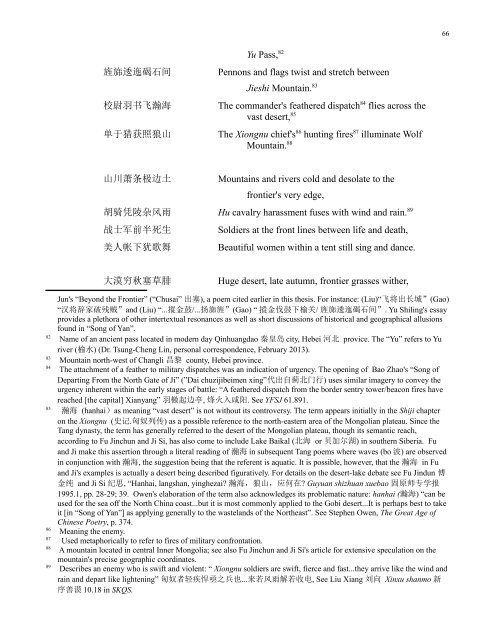View/Open - University of Victoria
View/Open - University of Victoria
View/Open - University of Victoria
Create successful ePaper yourself
Turn your PDF publications into a flip-book with our unique Google optimized e-Paper software.
66<br />
旌 旆 逶 迤 碣 石 间<br />
校 尉 羽 书 飞 瀚 海<br />
单 于 猎 获 照 狼 山<br />
Yu Pass, 82<br />
Pennons and flags twist and stretch between<br />
Jieshi Mountain. 83<br />
The commander's feathered dispatch 84 flies across the<br />
vast desert, 85<br />
The Xiongnu chief's 86 hunting fires 87 illuminate Wolf<br />
Mountain. 88<br />
山 川 萧 条 极 边 土<br />
Mountains and rivers cold and desolate to the<br />
frontier's very edge,<br />
胡 骑 凭 陵 杂 风 雨 Hu cavalry harassment fuses with wind and rain. 89<br />
战 士 军 前 半 死 生 Soldiers at the front lines between life and death,<br />
美 人 帐 下 犹 歌 舞 Beautiful women within a tent still sing and dance.<br />
大 漠 穷 秋 塞 草 腓<br />
Huge desert, late autumn, frontier grasses wither,<br />
Jun's “Beyond the Frontier” (“Chusai” 出 塞 ), a poem cited earlier in this thesis. For instance: (Liu)“ 飞 将 出 长 城 ”(Gao)<br />
“ 汉 将 辞 家 破 残 贼 ”and (Liu) “... 摐 金 鼓 /... 扬 旆 旌 ”(Gao) “ 摐 金 伐 鼓 下 榆 关 / 旌 旆 逶 迤 碣 石 间 ”. Yu Shiling's essay<br />
provides a plethora <strong>of</strong> other intertextual resonances as well as short discussions <strong>of</strong> historical and geographical allusions<br />
found in “Song <strong>of</strong> Yan”.<br />
82<br />
Name <strong>of</strong> an ancient pass located in modern day Qinhuangdao 秦 皇 岛 city, Hebei 河 北 provice. The “Yu” refers to Yu<br />
river ( 榆 水 ) (Dr. Tsung-Cheng Lin, personal correspondence, February 2013).<br />
83<br />
Mountain north-west <strong>of</strong> Changli 昌 黎 county, Hebei province.<br />
84<br />
The attachment <strong>of</strong> a feather to military dispatches was an indication <strong>of</strong> urgency. The opening <strong>of</strong> Bao Zhao's “Song <strong>of</strong><br />
Departing From the North Gate <strong>of</strong> Ji” (”Dai chuzijibeimen xing” 代 出 自 蓟 北 门 行 ) uses similar imagery to convey the<br />
urgency inherent within the early stages <strong>of</strong> battle: “A feathered dispatch from the border sentry tower/beacon fires have<br />
reached [the capital] Xianyang” 羽 檄 起 边 亭 , 烽 火 入 咸 阳 . See YFSJ 61.891.<br />
85<br />
瀚 海 (hanhai)as meaning “vast desert” is not without its controversy. The term appears initially in the Shiji chapter<br />
on the Xiongnu ( 史 记 . 匈 奴 列 传 ) as a possible reference to the north-eastern area <strong>of</strong> the Mongolian plateau. Since the<br />
Tang dynasty, the term has generally referred to the desert <strong>of</strong> the Mongolian plateau, though its semantic reach,<br />
according to Fu Jinchun and Ji Si, has also come to include Lake Baikal ( 北 海 or 贝 加 尔 湖 ) in southern Siberia. Fu<br />
and Ji make this assertion through a literal reading <strong>of</strong> 瀚 海 in subsequent Tang poems where waves (bo 波 ) are observed<br />
in conjunction with 瀚 海 , the suggestion being that the referent is aquatic. It is possible, however, that the 瀚 海 in Fu<br />
and Ji's examples is actually a desert being described figuratively. For details on the desert-lake debate see Fu Jindun 傅<br />
金 纯 and Ji Si 纪 思 , “Hanhai, langshan, yinghezai? 瀚 海 , 狼 山 , 应 何 在 ? Guyuan shizhuan xuebao 固 原 师 专 学 报<br />
1995.1, pp. 28-29; 39. Owen's elaboration <strong>of</strong> the term also acknowledges its problematic nature: hanhai ( 瀚 海 ) “can be<br />
used for the sea <strong>of</strong>f the North China coast...but it is most commonly applied to the Gobi desert...It is perhaps best to take<br />
it [in “Song <strong>of</strong> Yan”] as applying generally to the wastelands <strong>of</strong> the Northeast”. See Stephen Owen, The Great Age <strong>of</strong><br />
Chinese Poetry, p. 374.<br />
86<br />
Meaning the enemy.<br />
87<br />
Used metaphorically to refer to fires <strong>of</strong> military confrontation.<br />
88<br />
A mountain located in central Inner Mongolia; see also Fu Jinchun and Ji Si's article for extensive speculation on the<br />
mountain's precise geographic coordinates.<br />
89<br />
Describes an enemy who is swift and violent: “ Xiongnu soldiers are swift, fierce and fast...they arrive like the wind and<br />
rain and depart like lightening” 匈 奴 者 轻 疾 悍 亟 之 兵 也 ... 来 若 风 雨 解 若 收 电 , See Liu Xiang 刘 向 Xinxu shanmo 新<br />
序 善 谟 10.18 in SKQS.
















